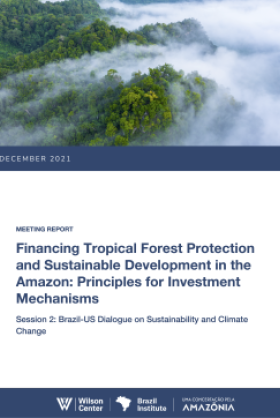Meeting Report | Financing Tropical Forest Protection: Session 2 of the Brazil-US Dialogue on Sustainability and Climate Change


In mid-September 2021, the Wilson Center, in partnership with Uma Concertação Pela Amazônia hosted a discussion with Brazilian and US nongovernmental stakeholders on how to best develop mechanisms for channeling capital effectively to support low carbon development and conservation in the Amazon, as well as working with local stakeholders to ensure they have access to these new funding sources and enough capacity to absorb and use new resources effectively.
Over the course of the session, three major policy recommendations emerged as critical to bolstering bilateral Brazil-US cooperation on investment in the Amazon region.
Report Recommendations
-
1. When it comes to financing through carbon market mechanisms, project-based credits need to be appropriately nested within jurisdictional accounting frameworks to avoid some of the worst concerns regarding risks such as leakage and additionality.
-
2. International funding for forests requires an integrated, layered approach that combines multiple types of capital with innovative tools and new mechanisms to evaluate and aggregate small projects into “large-enough” investment opportunities.
-
3. There needs to be significant attention given to “last-mile” readiness to ensure that local communities and local governments most impacted by forest degradation have access to financing and credit.
Author

Brazil Institute
The Brazil Institute—the only country-specific policy institution focused on Brazil in Washington—aims to deepen understanding of Brazil’s complex landscape and strengthen relations between Brazilian and US institutions across all sectors. Read more





